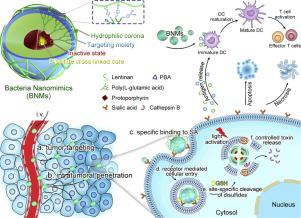当前位置:
X-MOL 学术
›
Nano Today
›
论文详情
Our official English website, www.x-mol.net, welcomes your
feedback! (Note: you will need to create a separate account there.)
Entirely Synthetic Bacterial Nanomimics for Highly-Effective Tumor Suppression and Immune Elicitation
Nano Today ( IF 13.2 ) Pub Date : 2020-12-01 , DOI: 10.1016/j.nantod.2020.100950 Dan Zhong , Xianghui Xu , Yunkun Li , Huayu Wu , Zhijun Zhang , Jun Yang , Hu Zhang , Qiyong Gong , Kui Luo , Zhongwei Gu
Nano Today ( IF 13.2 ) Pub Date : 2020-12-01 , DOI: 10.1016/j.nantod.2020.100950 Dan Zhong , Xianghui Xu , Yunkun Li , Huayu Wu , Zhijun Zhang , Jun Yang , Hu Zhang , Qiyong Gong , Kui Luo , Zhongwei Gu

|
ABSTRACT Bacteria are considered to be “perfect” anticancer agents on account of their unique capabilities of specific tumor targeting, active intratumoral penetration and controllable cytotoxicity induction, but so far there is no great success in clinical translations due to many challenging issues including intrinsic bacterial toxicity, potential immunogenicity and safety concerns. To address this dilemma, an artificial bacterial nanomimic (BNM) consisted of biocompatible multifunctional peptide dendrimers and a polysaccharide was exploited to imitate the structure and function of bacteria. The resulted BNMs could recognize and bind with the sialic acid (SA) moieties on cell surface, thereby achieving improved cellular uptake and intratumoral penetration. Light activated BNMs caused distinct tumor cell apoptosis and necrosis through greatly up-regulating the intracellular ROS level, evidenced with oxidative damage of lysosomes, cathepsin release and cell death. Meanwhile, both the BNMs and antigens releasing from dying cells significantly promoted the maturation of dendritic cells and secretion of pro-inflammatory cytokines, which further improved the antitumor effect. Encouragingly, light activated BNMs displayed excellent tumor suppression capacity and completely eliminated two tumors, and significantly prolonged the survival time. This study provides a new strategy for engineering therapeutic agents in a bioinspired fashion.
中文翻译:

用于高效肿瘤抑制和免疫诱导的全合成细菌纳米模拟物
摘要 细菌被认为是“完美”的抗癌药物,因为它们具有特定的肿瘤靶向、主动肿瘤内渗透和可控的细胞毒性诱导的独特能力,但由于包括内在细菌毒性在内的许多具有挑战性的问题,迄今为止在临床转化方面还没有取得巨大成功,潜在的免疫原性和安全问题。为了解决这个难题,一种由生物相容性多功能肽树枝状聚合物和多糖组成的人工细菌纳米模拟物 (BNM) 被用来模拟细菌的结构和功能。由此产生的 BNM 可以识别并结合细胞表面的唾液酸 (SA) 部分,从而提高细胞摄取和肿瘤内渗透。光激活的 BNMs 通过极大地上调细胞内 ROS 水平引起明显的肿瘤细胞凋亡和坏死,这可以通过溶酶体的氧化损伤、组织蛋白酶释放和细胞死亡来证明。同时,BNMs和死亡细胞释放的抗原均显着促进了树突状细胞的成熟和促炎细胞因子的分泌,进一步提高了抗肿瘤作用。令人鼓舞的是,光激活的 BNMs 显示出优异的肿瘤抑制能力,完全消除了两个肿瘤,并显着延长了生存时间。这项研究为以仿生方式设计治疗剂提供了一种新策略。BNMs和死亡细胞释放的抗原均显着促进了树突状细胞的成熟和促炎细胞因子的分泌,从而进一步提高了抗肿瘤作用。令人鼓舞的是,光激活的 BNMs 显示出优异的肿瘤抑制能力,完全消除了两个肿瘤,并显着延长了生存时间。这项研究为以仿生方式设计治疗剂提供了一种新策略。BNMs和死亡细胞释放的抗原均显着促进了树突状细胞的成熟和促炎细胞因子的分泌,从而进一步提高了抗肿瘤作用。令人鼓舞的是,光激活的 BNMs 显示出优异的肿瘤抑制能力,完全消除了两个肿瘤,并显着延长了生存时间。这项研究为以仿生方式设计治疗剂提供了一种新策略。
更新日期:2020-12-01
中文翻译:

用于高效肿瘤抑制和免疫诱导的全合成细菌纳米模拟物
摘要 细菌被认为是“完美”的抗癌药物,因为它们具有特定的肿瘤靶向、主动肿瘤内渗透和可控的细胞毒性诱导的独特能力,但由于包括内在细菌毒性在内的许多具有挑战性的问题,迄今为止在临床转化方面还没有取得巨大成功,潜在的免疫原性和安全问题。为了解决这个难题,一种由生物相容性多功能肽树枝状聚合物和多糖组成的人工细菌纳米模拟物 (BNM) 被用来模拟细菌的结构和功能。由此产生的 BNM 可以识别并结合细胞表面的唾液酸 (SA) 部分,从而提高细胞摄取和肿瘤内渗透。光激活的 BNMs 通过极大地上调细胞内 ROS 水平引起明显的肿瘤细胞凋亡和坏死,这可以通过溶酶体的氧化损伤、组织蛋白酶释放和细胞死亡来证明。同时,BNMs和死亡细胞释放的抗原均显着促进了树突状细胞的成熟和促炎细胞因子的分泌,进一步提高了抗肿瘤作用。令人鼓舞的是,光激活的 BNMs 显示出优异的肿瘤抑制能力,完全消除了两个肿瘤,并显着延长了生存时间。这项研究为以仿生方式设计治疗剂提供了一种新策略。BNMs和死亡细胞释放的抗原均显着促进了树突状细胞的成熟和促炎细胞因子的分泌,从而进一步提高了抗肿瘤作用。令人鼓舞的是,光激活的 BNMs 显示出优异的肿瘤抑制能力,完全消除了两个肿瘤,并显着延长了生存时间。这项研究为以仿生方式设计治疗剂提供了一种新策略。BNMs和死亡细胞释放的抗原均显着促进了树突状细胞的成熟和促炎细胞因子的分泌,从而进一步提高了抗肿瘤作用。令人鼓舞的是,光激活的 BNMs 显示出优异的肿瘤抑制能力,完全消除了两个肿瘤,并显着延长了生存时间。这项研究为以仿生方式设计治疗剂提供了一种新策略。











































 京公网安备 11010802027423号
京公网安备 11010802027423号